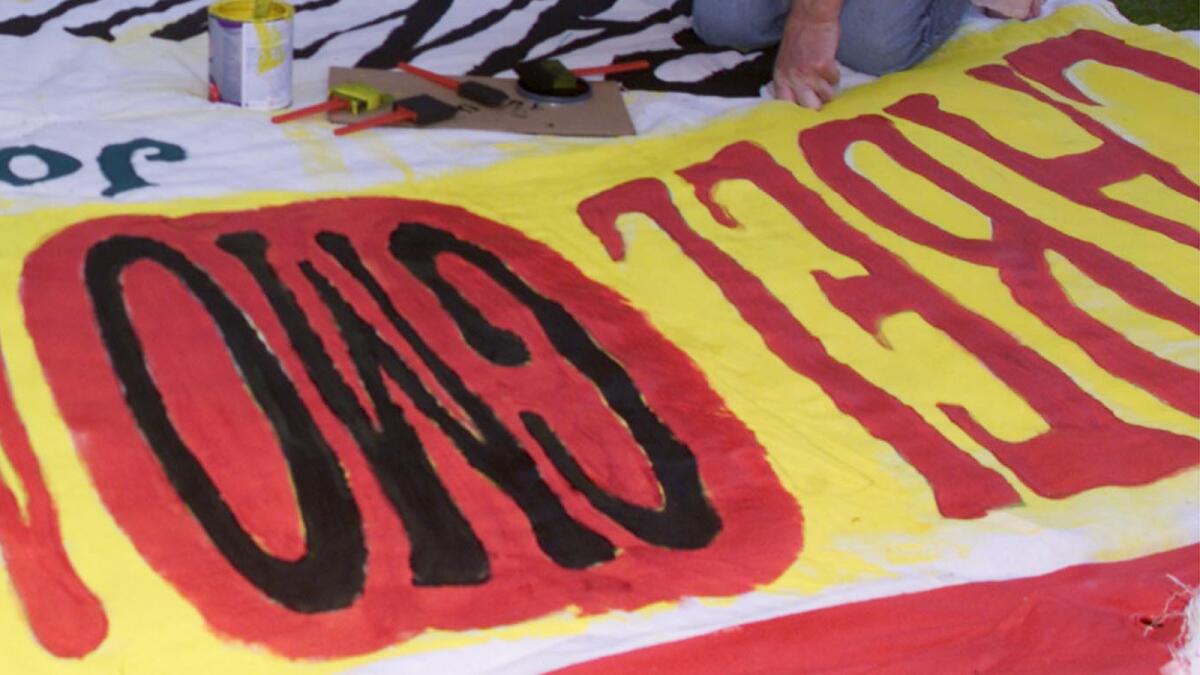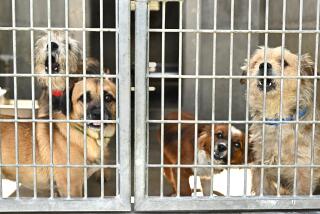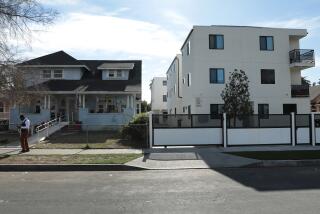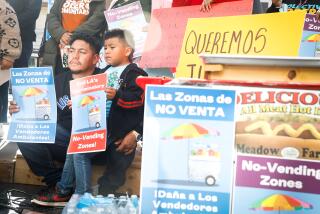L.A. council to weigh ban on growing genetically modified crops

Facing pressure from groups both inside and outside of Los Angeles, city lawmakers moved forward Tuesday with plans to regulate the growth of genetically modified crops.
The City Council voted to ask city staff to draft an ordinance banning the sale and growth of seeds and plants bearing genetically modified organisms within city limits. The law would be largely symbolic because there is little agriculture within the city.
But the proposed ban received heavy support, especially from advocates of a failed 2012 California ballot measure that would have required the labeling of GMO food products.
“The same way people across the nation watched and were widely inspired by the Prop. 37 campaign, they will be watching Los Angeles on the GMO-Free Zone legislation,” wrote Pamm Larry — an organic farmer who started a Chico-based organization to initiate Proposition 37 — in a letter submitted to the council. “You have a wonderful opportunity to take the lead now on this issue.”
The council received nearly 50 letters from community organizations, business owners and city residents in favor of the ban, and dozens of people showed up to council meetings on the issue Monday and Tuesday.
Genetically modified organisms, or GMOs, are plants or animals whose genetic material has been altered. Unlike crops grown through selective breeding to be bigger or firmer, the DNA of GMOs has been altered in laboratories, sometimes to resist pests and herbicides. Opponents of GMOs say they pose a threat to biodiversity and may be unsafe for consumption.
In an interview, Bob Goldberg, a UCLA plant molecular biologist and a member of the National Academy of Sciences, said that genetically modified crops are no different from those that farmers have been selectively breeding for centuries, and they pose no added health risk.
“There’s not been one documented case of a sneeze from anyone eating a genetically modified papaya,” he said.
Goldberg said the proposed ban wouldn’t affect Angelenos because GMO seeds are only sold to farmers commercially, and not in garden stores. And there are currently no GMO crops grown anywhere in Los Angeles County, other than in research laboratories, he said.
Karen Batra, communications director for the trade group Biotechnology Industry Organization, said the L.A. ban is bad policy that unfairly takes away choices from farmers.
“It’s just so unnecessary,” she said. “You’ve got this kind of very, very small group of people that are making a decision about something that doesn’t necessarily impact them directly.”
Only one L.A. council member, Joe Buscaino, voted against the motion passed Tuesday. Buscaino said in an interview that although he supports regulating GMOs, he thinks the issue would be better addressed on a state or federal level.
“Let’s focus on streets and sidewalks instead of seeds,” he said, adding that the city “is not equipped to investigate or enforce this ordinance.”
Councilman Paul Koretz, who cowrote the motion with Councilman Mitch O’Farrell, said in an interview that the city could rely on the L.A. County Agricultural Commissioner for enforcement, and that he thinks the ban would only get more important as urban farming becomes more popular in the region. Two other L.A. councilmen introduced a motion this month calling for landowners to receive tax breaks for turning empty lots into urban farms.
Supporters of the L.A. ban note that 52% of Los Angeles County voters supported Prop. 37. Four other California counties — Marin, Mendocino, Trinity and Santa Cruz — have passed ordinances banning the growth of GMOs, as well as Arcata, a small city in Humboldt County. Vermont lawmakers recently enacted a requirement that GMO foods be labeled. Oregon voters will consider a similar measure in November.
David King, the founding chairman of the Seed Library of Los Angeles, was one of the people who brought the issue to Koretz’s attention. His organization is dedicated to preserving agricultural diversity, and he said the ban proposed Tuesday would prevent accidental cross-pollination of GMO plants with others. He said the ban is somewhat preemptive, in case big agriculture companies begin selling GMO crops to home gardeners.
It’s simple, he says: “I don’t like their technology, and I don’t want their technology.”
City Council President Herb Wesson said Tuesday that he wants the ordinance draft to go through council committees again before it returns to the full council for a final vote.
soumya.karlamangla@latimes.com
Follow @skarlamangla on Twitter for more L.A. government news.
More to Read
Start your day right
Sign up for Essential California for news, features and recommendations from the L.A. Times and beyond in your inbox six days a week.
You may occasionally receive promotional content from the Los Angeles Times.







